- Home
- Jerold Last
Unbearably Deadly (Roger and Suzanne South American Mystery Series Book 9) Page 13
Unbearably Deadly (Roger and Suzanne South American Mystery Series Book 9) Read online
Page 13
We all stood around in dead silence for a while before he answered his own question. “Sergeant Preston’s Law of the Yukon is actually quite simple. It states, ‘the scenery only changes for the lead dog’!”
That got a lot of laughs and a few moans from the audience. He waited a moment before continuing. “The point of course is that some dogs will be in front and most will be further back. Let’s have a show of hands. How many of you would prefer to be in front where you could see the scenery if you were a sled dog?”
About half of the audience’s hands went up, mostly men.
“How many of you would enjoy things just as much from the back?”
Some more hands went up, with a substantial number of the more cautious members of the audience not picking either choice.
“OK, I assume most of you are thinking what’s all this got to do with dog sleds?” continued Parks. “Actually it has everything to do with our decisions about which dog should go where in the harness. But first I have to tell you a little bit about animal behavior, especially with regard to predator animals who live in packs in nature. Has anyone here ever lived with several dogs?”
Nobody had anything to say.
“In every pack, there has to be a leader. That’s the so-called alpha animal. The alpha dog can be chosen by combat, like in wolf packs in the wild, or by who got there first, as is often the case with multigenerational packs like you’d see at a dog breeder. In nature the canines, wolf or dog, will have an alpha bitch running the pack, and an alpha male that is the strongest and fastest among the males, the only male that can mate with her. The alpha bitch is the decision maker for the pack. The other dogs or wolves will follow her lead.
“So the alpha bitch is a natural leader, accustomed to making decisions for all of the others, and often the smartest animal in the pack. In the wild the alpha she-wolf leads the hunt and is accustomed to being the first one to feed on the carcass after the pack makes a kill. In civilized society she’s the first dog out the door when it’s opened and she commands the best position on the couch or wherever she chooses to be. She doesn’t like the idea of another dog getting to the finish line ahead of her. Where do you think she belongs in the sled dog hierarchy?”
One of the older couple who had recognized Sergeant Preston of the Yukon’s name raised her hand cautiously. Parks pointed to her. She said, “I think she should be the lead dog,” in a slightly tentative tone.
“Very good,” responded the Iditarod trainer. “Just like you want your biggest, strongest dogs at the back, where they can pull the sled along to keep up with whatever pace the lead dog is setting. The rest of the dogs can go anywhere in-between, as long as they get along with their brace mate. That means you really have to know each dog’s personality and how they all get along with each other. That’s why we spend so much time breeding and training the dogs for races like the Iditarod.”
He finished his demonstration to loud applause then started to walk back to the dog pens. We hustled after him to catch up. “May I ask you a few questions, please, Mr. Parks?” I asked politely.
“It’s Rodney, or Rod, and I’ve got ten minutes or so before my ride leaves. What can I help you with?”
I tried to look as unofficial as I could. “Were you here last week when those two tourists were attacked by a bear?”
“No, I wasn’t,” he replied. “I was having the Veterinarian in Anchorage check all of the dogs. We do that once a month to make sure everything is OK health-wise and they’re not getting all stressed out. With the driving and all, I was down there for three days. The bear attack was on a Wednesday. I was down in Anchorage that Tuesday, Wednesday, and Thursday.”
“Can you tell me the name and address of your Veterinarian, please?”
It always amazes me when they don’t ask for your name, badge, or credentials, and just answer your questions. That’s usually the mark of an innocent citizen. “It’s Dr. Hardaway. He’s at 446 Second Street. You can check all of this out with him.”
“Thank you very much for your time and your help. Good luck in the big race,” I replied. And off we went to relax a bit before dinner, comfortably erasing a potential suspect from our list of possible murderers.
Chapter14. Our first Kantishna Lodge party
Armed with a cold 12-pack of Midnight Sun Ale, the local microbrewery product Joe Corti had introduced us to for sale at the Lodge, Suzanne and I wandered out back to the big bonfire, the centerpiece of a staff party currently in progress. At 11 PM it was finally dark and getting pretty cold, so everyone was gathered closely around the fire. The only ones there who didn’t seem to feel the cold were the local mosquitos, which were out in full force tonight. There was a large keg of beer, a tub full of ice containing bottled beers and ales from various local breweries, a few bottles of wine with screw caps, some plastic glasses, and lots of chips and dips. Suzanne added 10 of our bottles to the tub, popped the tops from the other two, and handed me one.
There was a lot of noise and a strong sense of young people, and some not so young people too, having fun being part of the crowd drinking beer as fast as they could. Loud music from a ghetto blaster blended with the collective sound of conversations between staff members, Park Rangers, and some of the younger tourists who’d stayed up late.
“We should fit in perfectly with a bottle of local beer in hand. Why don’t we hang out here by the tub for a couple of minutes and see if anyone notices us,” Suzanne suggested with a conspiratorial smile.
In less than a minute we were surrounded by several people we’d met previously, including the activities guides Joe Corti and Howard Cram, the bus driver guides Forrest Bednor and Steve Schuck, a couple of Park Rangers, and several staff members from the Lodge. We were also introduced to a wilderness biking guide named Lloyd Farquahr and half a dozen guests with forgettable names including the couple from Seattle. She still wore the ridiculous (at least on her) cowboy hat, which reminded me of the line from the old western movies, “He’s all hat and no cowboy!”. A warm welcome to “the real Kantishna Lodge” seemed to be the norm here. Almost immediately we were in the midst of a discussion of things to see and do in and around the Lodge.
The guests, who’d mostly arrived with us the day before, talked about what activities they’d participated in that day. We heard about gold panning, fly fishing, wilderness biking, hiking, photography, bird watching, dog sled demonstrations, and various other things to see and do in the Alaskan wilderness. Joe extolled Suzanne’s virtues as a fly fisher. The group started to break up into smaller units, based on similar interests or proximity to the beer. Suzanne and I ended up standing alone several yards from the tub of iced beer.
Forrest Bednor, our erstwhile companion on the train ride from Anchorage to Denali, stepped over to the tub to pull out a fresh bottle and joined us. “How are you folks doing tonight?”
I took a short sip of beer and looked at him. This was a good time to stay alert. I still didn’t like the vibes he was giving off, but couldn’t put my finger on what it was that bothered me the most about him. “We’re good. How about you?”
He took a long pull on his beer. “A lot better now! I needed that. What did you two do today besides Suzanne’s fishing, which seemed to impress the heck out of Joe? Did you get a chance to see some more of the Park?”
“Yes, we did,” answered Suzanne. “We got a chance to try gold panning with Joe Corti, saw sled dogs and the old mine, and wandered around the Lodge grounds a bit.”
Bednor took another long pull from his beer before pausing thoughtfully then asking, “What are you doing here at the Kantishna Lodge tonight? I thought you folks were staying at The Grande Denali Lodge in town.”
“There was a last minute cancellation, which gave us the opportunity to move out here. We jumped at the chance when it was offered to us,” I replied.
Alarm bells started to go off in my head when Bednor began asking me personal questions again. “Where did you say you’re from?”
The relief bus driver and guide digested that answer for a bit. “What do you do for a living back home?”
I decided he deserved a non-answer to that one. “Suzanne works for one of the local colleges, I’m self-employed as a consultant.”
We were saved from more grilling when several of the other staff, the two Park Rangers we’d met previously that evening and at the Park Headquarters, and most of the guests decided to rejoin our rapidly growing group. “Hey, you guys, have another beer,” said Joe Corti, handing each of the three of us a freshly opened cold bottle.
Howard Cram ambled over to grab himself another bottle from the tub, obviously not his first, and joined the group, at least in body. However, there didn’t seem to be any meaningful social lubrication for him after several beers and he remained taciturn even as part of the group. I pondered whether the proper aphorism for Howie was “in vino, silence.”
The Chief Ranger, Manfred Fleming, and his colleague Ed Farrell had a couple of beers in hand and looked completely relaxed. “Make sure you get a chance to look at the old gold mining equipment all around the Lodge while you’re here,” advised Fleming, talking to all of the guests. “You should try the gold panning, too. The history of Alaska, especially up here around Denali, is all about gold mining and the wilderness lifestyle.”
“Fred’s right,” agreed Farrell. “Your experience up here wouldn’t be complete if you didn’t leave with a little bit of gold you found panning the creek in your pocket.”
One of the guests pulled a little plastic vial from his pocket. “Look at this,” he said proudly. A few flecks of gold showed sticking against the wall of his tiny plastic vial. “I found this much gold after less than an hour of panning today.”
Suzanne and I, as did Fred Fleming I noted with some amusement, congratulated him on his good fortune.
Seeing Chief Ranger Fleming and Ranger Farrell here at the party, I reevaluated my assumption that the Kantishna Lodge and the killing site were too far away from the Visitors Center where they worked for either of them to be plausible suspects in the killing. Both of them moved higher up on my list of hypothetical suspects.
The more I’d thought about the two goons who’d attacked us in the alley behind the bar in Denali, the more convinced I was that whoever killed the Roberts had made a huge mistake. Someone with a guilty conscience had hired the goons on very short notice in an attempt to discourage us from coming to the Park to investigate the murders. There wasn’t any reason for someone in Chile who’d committed a hit and run crime to have done that, nor would they have had the local contacts to make it possible for them to have hired the miners to discourage us so soon after we got to Denali. I was about 90% certain we’d find the answers to who killed the Roberts here in the National Park, not in Chile.
The random conversations at the party continued through our third bottles of the local brew before we decided to call it a night. I didn’t think I’d learned much about our most likely murder suspects this evening, but certainly could start ranking them for charm and social skills. The charm list would have Joe Corti and Fred Fleming at or near the top, with Howard Cram and Forrest Bednor well down toward the bottom.
When we got back to our rental cabin I recycled the beer I’d had to drink at the party, then sat down with my fancy satellite phone and speed dialed Gretchen Kaufman’s personal cell phone number. We were talking immediately, with a good clear connection.
Nothing new had happened in Anchorage since we’d left that morning. Even though I no longer suspected a Chilean connection, it never hurts to be thorough, just in case. “Did Barbara find out any more about the possible suspects with Chilean passports?” I asked during the first break in Gretchen’s narrative.
She replied immediately, “If they flew up here directly from the lower 48 states they didn’t ever leave the country so there wouldn’t have been any passport checks or controls at the airports. However, even if they paid cash at the hotel, they would still have to have imprinted a credit card for incidentals. This meant we had the possibility of a passport being used for I.D. or a credit card with a Chilean address, and that’s what Barbara looked for. She got one passport and two credit cards.
“The Correa couple from Santiago checks out OK. They’re part of a tour group that visited the Park the day before the murders. They have a perfect alibi for the day of the killings; the tour guides and several of the other folks on the tour saw them on a hike the tour group took from the entrance to the Park, which puts them 90 miles away from where the Roberts were killed at about the time of the murders.”
“So far, so good,” I thought. That fit with my current theory that the murderer was somebody local.
There was a short pause while she checked her notes. “The credit card turned out to be a forgery, so that lead seems to be a dead end. But the guy with the phony credit card is definitely a person of interest, and we’ll follow up. I’m having the room fingerprinted, but that’s a shot in the dark since its been cleaned several times since he stayed there. If he used the forged credit card for travel or to eat somewhere maybe we’ll get a lead from that.”
I filled her in on our day here in the park. “We got to the Lodge OK and our reservations were fine. They’ve got us in cabin #12. We’ve met a couple of guides and several staff members to talk to. They all invited us to the big party for the staff and whoever is staying at the Lodge. It sounds like a good excuse to drink beer and collect mosquito bites almost every night. Everyone is real friendly. We’ve spent most of our time so far chatting with staffers and the local Park Rangers. Hang on for a second. I want to step outside for the next part.”
Closing the door behind me I stood out on the porch of the unit for the rest of the conversation just in case our room was bugged. It wasn’t likely, at least this soon after we got here.
“Hello, again,” I continued. “Sorry for the delay. I just wanted to get into an assured totally bug-free environment, at least in the electronic sense, for the rest of this conversation.”
“That’s OK. There’s no such thing as being too careful when you’re on an undercover assignment,” responded Gretchen.
“I have a potentially offensive and insensitive question for you. May I ask it?”
“Of course.”
“What can you tell me about Ed Barclay’s background? Especially, what did he do to end up posted to Anchorage, Alaska, which I assume is a career dead end for him?”
“I’ve been wondering when you’d get around to asking me this question, so I went over his file pretty thoroughly. He was never a potential star, but he was doing OK with several postings to progressively more responsible positions in the Midwestern and Southeastern US. Agent Barclay started in Indiana, then Kentucky, South Carolina, Ohio, and finally Chicago. He had several small mistakes along the way, but his big screw-up was in Chicago. To make a long story short, he did an unauthorized surveillance and an equally unauthorized attempted arrest with a SWAT team that cost the bureau a year of careful work infiltrating a would-be terrorist organization and any possibility of a successful prosecution of several very bad people. He was reassigned to Alaska immediately after that fiasco.”
I pondered what this meant before replying. “That fits my impression of him. Do you think he’s actually as stupid as he likes to appear? Or do you think his multiple mistakes and general botching up of this case was deliberate?”
Gretchen paused to gather her thoughts before answering. “I think the jury is still out on the answer to that question, Roger. I see we’re thinking along the same lines here. We should probably proceed on the assumption that the right answer is some of both, and act accordingly. As of now, I’m planning to suggest an early retirement for Ed to the powers that be in the Bureau when all of this is over, but some good hard evidence that he’s a bad guy
rather than a stupid good guy would be a big help in winning that battle.”
We said our goodnights. I promised to check in the next night and went back into the room. Suzanne and I snuggled in front of the TV for an hour before finally going to sleep.
Chapter15. Wilderness biking, detective style
We were cycling along a narrow fire road surrounded on all sides by forest and tundra, with occasional rocky outcroppings to lend features to the terrain. There wasn’t any particular destination. The trip today was just to get a feeling for the place and perhaps to retrace some part of the Roberts’ itinerary when they explored the area behind the tourist attractions surrounding the Kantishna Lodge.
We pedaled along at a leisurely pace, enjoying the scenery. Cleared areas of forest were actually visible from the road as we passed them. We recognized deciduous birch and alder trees, while other varieties were new to me or looked different from their California counterparts. There were plenty of evergreens too, mostly pines and spruce.

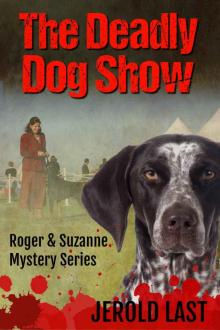 The Deadly Dog Show (Roger and Suzanne South American Mystery Series Book 6)
The Deadly Dog Show (Roger and Suzanne South American Mystery Series Book 6)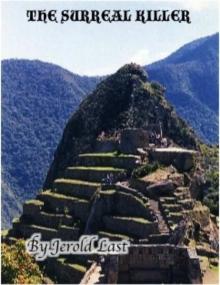 The Surreal Killer (Roger and Suzanne South American Mystery Series Book 2)
The Surreal Killer (Roger and Suzanne South American Mystery Series Book 2)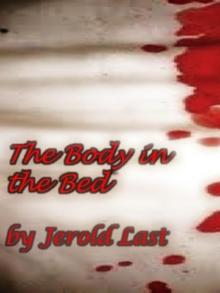 The Body in the Bed (Roger and Suzanne South American Mystery Series Book 5)
The Body in the Bed (Roger and Suzanne South American Mystery Series Book 5)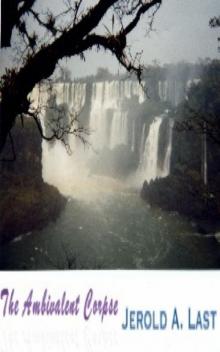 The Ambivalent Corpse (Roger and Suzanne South American Mystery Series Book 1)
The Ambivalent Corpse (Roger and Suzanne South American Mystery Series Book 1)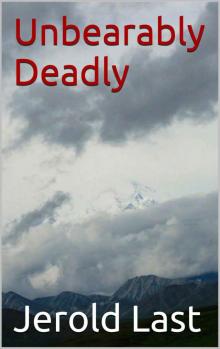 Unbearably Deadly (Roger and Suzanne South American Mystery Series Book 9)
Unbearably Deadly (Roger and Suzanne South American Mystery Series Book 9)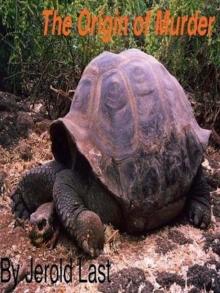 The Origin Of Murder (Roger and Suzanne South American Mystery Series Book 8)
The Origin Of Murder (Roger and Suzanne South American Mystery Series Book 8)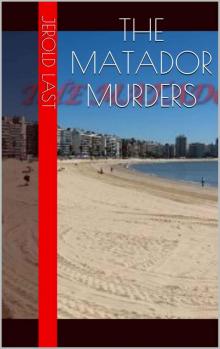 The Matador Murders (Roger and Suzanne South American Mystery Series Book 4)
The Matador Murders (Roger and Suzanne South American Mystery Series Book 4)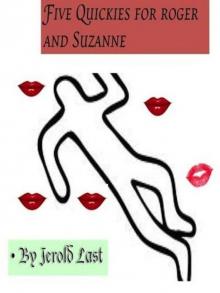 Five Quickies For Roger And Suzanne (Roger and Suzanne South American Mystery Series Book 7)
Five Quickies For Roger And Suzanne (Roger and Suzanne South American Mystery Series Book 7)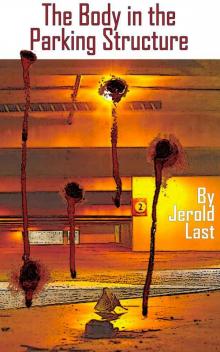 The Body in the Parking Structure (Roger and Suzanne South American Mystery Series Book 4)
The Body in the Parking Structure (Roger and Suzanne South American Mystery Series Book 4)